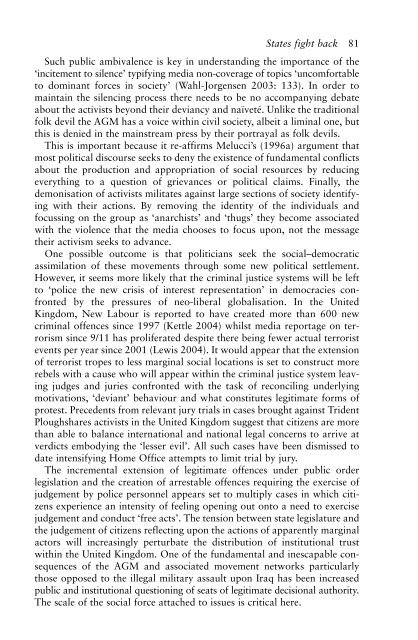Complexity and Social Movements: Multitudes at the Edge of Chaos ...
Complexity and Social Movements: Multitudes at the Edge of Chaos ...
Complexity and Social Movements: Multitudes at the Edge of Chaos ...
Create successful ePaper yourself
Turn your PDF publications into a flip-book with our unique Google optimized e-Paper software.
St<strong>at</strong>es fight back 81<br />
Such public ambivalence is key in underst<strong>and</strong>ing <strong>the</strong> importance <strong>of</strong> <strong>the</strong><br />
‘incitement to silence’ typifying media non-coverage <strong>of</strong> topics ‘uncomfortable<br />
to dominant forces in society’ (Wahl-Jorgensen 2003: 133). In order to<br />
maintain <strong>the</strong> silencing process <strong>the</strong>re needs to be no accompanying deb<strong>at</strong>e<br />
about <strong>the</strong> activists beyond <strong>the</strong>ir deviancy <strong>and</strong> naïveté. Unlike <strong>the</strong> traditional<br />
folk devil <strong>the</strong> AGM has a voice within civil society, albeit a liminal one, but<br />
this is denied in <strong>the</strong> mainstream press by <strong>the</strong>ir portrayal as folk devils.<br />
This is important because it re-affirms Melucci’s (1996a) argument th<strong>at</strong><br />
most political discourse seeks to deny <strong>the</strong> existence <strong>of</strong> fundamental conflicts<br />
about <strong>the</strong> production <strong>and</strong> appropri<strong>at</strong>ion <strong>of</strong> social resources by reducing<br />
everything to a question <strong>of</strong> grievances or political claims. Finally, <strong>the</strong><br />
demonis<strong>at</strong>ion <strong>of</strong> activists milit<strong>at</strong>es against large sections <strong>of</strong> society identifying<br />
with <strong>the</strong>ir actions. By removing <strong>the</strong> identity <strong>of</strong> <strong>the</strong> individuals <strong>and</strong><br />
focussing on <strong>the</strong> group as ‘anarchists’ <strong>and</strong> ‘thugs’ <strong>the</strong>y become associ<strong>at</strong>ed<br />
with <strong>the</strong> violence th<strong>at</strong> <strong>the</strong> media chooses to focus upon, not <strong>the</strong> message<br />
<strong>the</strong>ir activism seeks to advance.<br />
One possible outcome is th<strong>at</strong> politicians seek <strong>the</strong> social–democr<strong>at</strong>ic<br />
assimil<strong>at</strong>ion <strong>of</strong> <strong>the</strong>se movements through some new political settlement.<br />
However, it seems more likely th<strong>at</strong> <strong>the</strong> criminal justice systems will be left<br />
to ‘police <strong>the</strong> new crisis <strong>of</strong> interest represent<strong>at</strong>ion’ in democracies confronted<br />
by <strong>the</strong> pressures <strong>of</strong> neo-liberal globalis<strong>at</strong>ion. In <strong>the</strong> United<br />
Kingdom, New Labour is reported to have cre<strong>at</strong>ed more than 600 new<br />
criminal <strong>of</strong>fences since 1997 (Kettle 2004) whilst media reportage on terrorism<br />
since 9/11 has prolifer<strong>at</strong>ed despite <strong>the</strong>re being fewer actual terrorist<br />
events per year since 2001 (Lewis 2004). It would appear th<strong>at</strong> <strong>the</strong> extension<br />
<strong>of</strong> terrorist tropes to less marginal social loc<strong>at</strong>ions is set to construct more<br />
rebels with a cause who will appear within <strong>the</strong> criminal justice system leaving<br />
judges <strong>and</strong> juries confronted with <strong>the</strong> task <strong>of</strong> reconciling underlying<br />
motiv<strong>at</strong>ions, ‘deviant’ behaviour <strong>and</strong> wh<strong>at</strong> constitutes legitim<strong>at</strong>e forms <strong>of</strong><br />
protest. Precedents from relevant jury trials in cases brought against Trident<br />
Ploughshares activists in <strong>the</strong> United Kingdom suggest th<strong>at</strong> citizens are more<br />
than able to balance intern<strong>at</strong>ional <strong>and</strong> n<strong>at</strong>ional legal concerns to arrive <strong>at</strong><br />
verdicts embodying <strong>the</strong> ‘lesser evil’. All such cases have been dismissed to<br />
d<strong>at</strong>e intensifying Home Office <strong>at</strong>tempts to limit trial by jury.<br />
The incremental extension <strong>of</strong> legitim<strong>at</strong>e <strong>of</strong>fences under public order<br />
legisl<strong>at</strong>ion <strong>and</strong> <strong>the</strong> cre<strong>at</strong>ion <strong>of</strong> arrestable <strong>of</strong>fences requiring <strong>the</strong> exercise <strong>of</strong><br />
judgement by police personnel appears set to multiply cases in which citizens<br />
experience an intensity <strong>of</strong> feeling opening out onto a need to exercise<br />
judgement <strong>and</strong> conduct ‘free acts’. The tension between st<strong>at</strong>e legisl<strong>at</strong>ure <strong>and</strong><br />
<strong>the</strong> judgement <strong>of</strong> citizens reflecting upon <strong>the</strong> actions <strong>of</strong> apparently marginal<br />
actors will increasingly perturb<strong>at</strong>e <strong>the</strong> distribution <strong>of</strong> institutional trust<br />
within <strong>the</strong> United Kingdom. One <strong>of</strong> <strong>the</strong> fundamental <strong>and</strong> inescapable consequences<br />
<strong>of</strong> <strong>the</strong> AGM <strong>and</strong> associ<strong>at</strong>ed movement networks particularly<br />
those opposed to <strong>the</strong> illegal military assault upon Iraq has been increased<br />
public <strong>and</strong> institutional questioning <strong>of</strong> se<strong>at</strong>s <strong>of</strong> legitim<strong>at</strong>e decisional authority.<br />
The scale <strong>of</strong> <strong>the</strong> social force <strong>at</strong>tached to issues is critical here.




